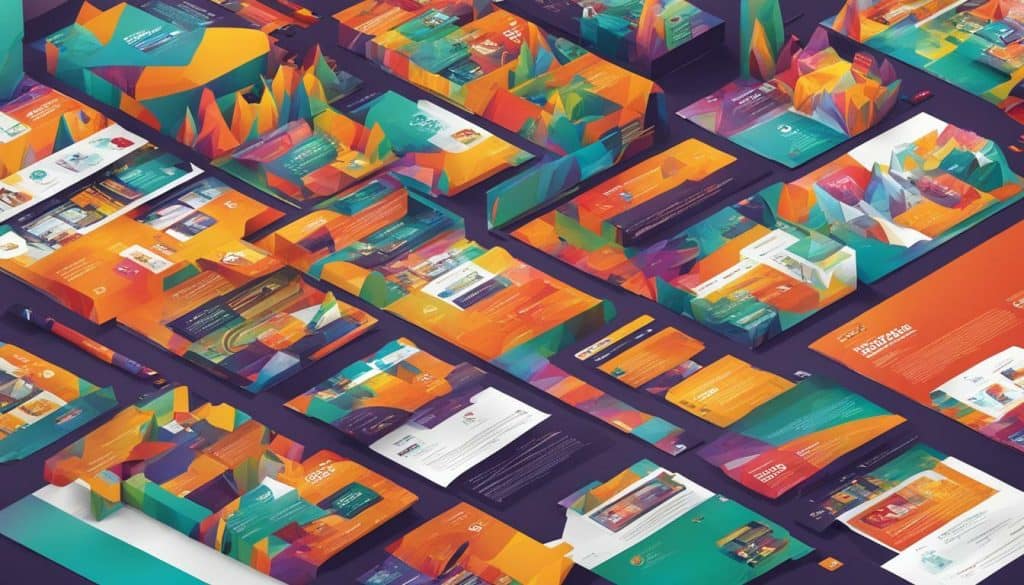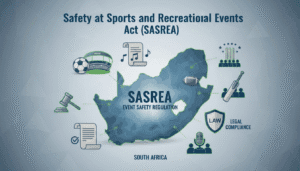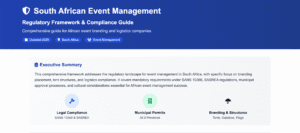Event marketing and promotion are crucial strategies for businesses looking to boost their brand’s visibility and engage their South African audience. By planning, organizing, and executing events, businesses can effectively promote their brand, product, or service. These events can take various forms, including conferences, trade shows, seminars, pop-up shops, and more. Event marketing provides numerous benefits, such as generating new business opportunities, engaging customers directly, building brand awareness, and promoting product and industry education.
- Event marketing and promotion are valuable strategies for boosting brand visibility in South Africa.
- Events can take various forms, including conferences, trade shows, and pop-up shops.
- Event marketing generates new business opportunities and engages customers directly.
- Building brand awareness and promoting product and industry education are key benefits of event marketing.
- Effective event marketing requires careful planning, setting SMART goals, and personalized messaging.
The Benefits of Event Marketing
Event marketing offers businesses numerous benefits, from creating meaningful connections with customers to driving brand awareness and generating new business opportunities. Engaging customers directly through well-executed events allows businesses to establish personal connections and build trust. According to a survey, 84% of consumers say they are more likely to buy from a brand they have a personal connection with. Events provide the perfect platform for fostering these connections, allowing businesses to interact with their target audience on a deeper level.
One of the key advantages of event marketing is its ability to build brand awareness. By hosting or participating in events, businesses can showcase their products or services to a large and relevant audience. Whether it’s through sponsorships, exhibits, or presentations, events provide businesses with a unique opportunity to stand out from the competition and create a memorable brand experience. Research shows that 98% of consumers feel more inclined to purchase after attending an activation event.
Furthermore, events offer businesses the chance to generate new business opportunities. By bringing together industry professionals, potential customers, and other stakeholders, events create a networking environment that can lead to valuable partnerships, collaborations, and sales. In fact, 85% of event attendees say that they are more likely to purchase a product or service after participating in an event. This makes events a powerful lead generation tool for businesses looking to expand their customer base and drive revenue.
| Benefits of Event Marketing | Statistics |
|---|---|
| Creating meaningful connections with customers | 84% of consumers are more likely to buy from a brand they have a personal connection with. |
| Driving brand awareness | 98% of consumers feel more inclined to purchase after attending an activation event. |
| Generating new business opportunities | 85% of event attendees are more likely to purchase a product or service after participating in an event. |

In conclusion, event marketing is a powerful strategy that can benefit businesses in South Africa and beyond. By creating meaningful connections with customers, driving brand awareness, and generating new business opportunities, events have the potential to significantly impact a company’s bottom line. To leverage the full potential of event marketing, businesses should work with an event marketing agency that can provide expert guidance and execute effective event marketing tactics and campaigns. With the right strategy, businesses can maximize their ROI and achieve their marketing goals through successful event marketing.
Types of Events for Marketing and Promotion
Businesses have a wide range of events to choose from when it comes to marketing and promotion, including conferences, trade shows, seminars, and digital events. These events provide unique opportunities to engage with customers, build brand awareness, and promote products and services. Let’s explore some of the most effective types of events for marketing and promotion: In addition to understanding the types of events, businesses must implement effective event marketing techniques for success to maximize their impact. Utilizing social media, email campaigns, and strategic partnerships can enhance visibility and attract a larger audience. By leveraging these strategies, companies can create memorable experiences that resonate with attendees and foster long-lasting customer relationships.
Conferences
Conferences bring together industry experts, thought leaders, and professionals to share knowledge, network, and discuss emerging trends. They serve as a platform for businesses to showcase their expertise, demonstrate thought leadership, and connect with potential customers. Conferences can be held in-person or virtually, providing flexibility and accessibility to a wide audience.
Trade Shows
Trade shows are exhibitions where businesses from a specific industry display their products or services. They offer a great opportunity for businesses to generate leads, meet potential customers face-to-face, and build brand awareness. Trade shows often attract a targeted audience, making it easier for businesses to connect with their ideal customers.
Seminars
Seminars are educational events where experts share insights, ideas, and knowledge about a specific topic. Businesses can host seminars to educate their target audience about industry trends, demonstrate their expertise, and position themselves as thought leaders. Seminars can be delivered in-person or online, offering flexibility for attendees to participate.
Digital Events
In today’s digital world, hosting virtual events has become increasingly popular. Digital events include webinars, virtual conferences, and online workshops. These events provide businesses with the opportunity to reach a global audience, reduce costs, and easily track attendee data. Digital events also offer interactive features such as live chats and Q&A sessions, enhancing attendee engagement.
| Types of Events | Advantages |
|---|---|
| Conferences | Opportunity to showcase expertise and connect with industry professionals. |
| Trade Shows | Generate leads, meet potential customers, and raise brand visibility. |
| Seminars | Educate target audience, demonstrate thought leadership, and build credibility. |
| Digital Events | Reach a global audience, reduce costs, and offer interactive features. |
By leveraging the power of these different event types, businesses can effectively market and promote their brand, attract new customers, and stay ahead of the competition. Remember to tailor your event strategy based on your target audience and marketing goals to achieve optimal results.

Events have a significant impact on business goals, from generating a positive brand perception to educating customers and driving sales. When planned and executed effectively, events can serve as powerful marketing tools that leave a lasting impression on attendees. One important aspect of event marketing is the use of promotional materials that help create a memorable experience and reinforce brand messaging.

Event promotional materials play a crucial role in attracting attendees and conveying key information. From eye-catching banners and signage to informative brochures and handouts, these materials serve as valuable touchpoints during the event. They not only create visual appeal but also provide attendees with relevant details about the brand, product, or service being promoted.
Tables and lists can also be effective in organizing and presenting information at events. For instance, a well-designed table displaying product features and pricing can help potential customers make informed decisions. Similarly, a list of speakers or agenda can help attendees plan their schedule and make the most of their time at the event.
“Event promotional materials serve as valuable touchpoints during the event, creating visual appeal and providing attendees with relevant details.”
Quotes from satisfied customers or industry experts can also be incorporated into event materials to build credibility and enhance the brand’s reputation. These quotes can be strategically placed on brochures, posters, or even on digital platforms such as event websites or social media pages.
To summarize, event promotional materials are essential for creating a memorable and impactful event experience. They serve as valuable tools for attracting attendees, conveying key information, and reinforcing brand messaging. Whether it’s banners, brochures, tables, or quotes, utilizing these materials effectively can contribute to the overall success of an event and help businesses achieve their goals.
Building an Effective Event Marketing Plan
To succeed in event marketing, businesses should have a well-defined plan that includes setting SMART goals, understanding attendees’ needs, and collaborating with event management and promotion agencies. A strong marketing plan acts as a roadmap, guiding you through the entire event process and ensuring your efforts are aligned with your business objectives.
One essential aspect of creating an effective event marketing plan is setting SMART goals. SMART stands for Specific, Measurable, Achievable, Relevant, and Time-bound. By setting clear and quantifiable goals, you can track your progress and evaluate the success of your event marketing efforts. For example, a SMART goal could be to increase event attendance by 20% compared to the previous year or generate 50 new leads during the event.
Understanding the needs and preferences of your attendees is crucial in delivering a successful event. Conduct market research, collect feedback from previous events, and conduct surveys to gather insights about what your target audience desires. Use this information to tailor your event program, choose relevant speakers, and design engaging activities that resonate with attendees.
Collaborating with event management and promotion agencies can greatly enhance the effectiveness of your event marketing. These agencies are experts in planning and executing events, ensuring seamless coordination, and maximizing attendee satisfaction. They can handle logistics, venue selection, marketing materials, and promotion strategies, allowing you to focus on delivering a memorable event experience. These agencies bring a wealth of knowledge and experience to your event planning process, helping you achieve your desired outcomes.
| Benefits of Collaborating with Event Management and Promotion Agencies | |
|---|---|
| Expertise and Experience | Event management agencies have a deep understanding of the industry, trends, and best practices. They can provide guidance and insights to optimize your event marketing strategies. |
| Efficiency and Resource Optimization | By outsourcing event management and promotion tasks, you can save time, reduce stress, and allocate internal resources to other business priorities. |
| Professional Network and Relationships | Event management agencies have established relationships with vendors, venues, and service providers. They can leverage these connections to negotiate better deals and enhance the overall event experience. |
| Cost-Effectiveness | Although hiring an event management agency incurs a cost, it can potentially save you money in the long run through their efficient use of resources and expertise in budget management. |
In conclusion, an effective event marketing plan is crucial for achieving your business goals through impactful events. By setting SMART goals, understanding attendees’ needs, and collaborating with event management and promotion agencies, you can maximize the success of your event marketing efforts, enhance attendee satisfaction, and drive business growth.

Note: The image above illustrates the key components of an event marketing plan and can serve as a visual reference for your planning process.
Promoting Your Event
Promoting your event is crucial to ensure maximum attendance and engagement, and can be achieved through various strategies such as high-converting landing pages and leveraging social media platforms. A well-designed landing page serves as a powerful tool to capture the interest of potential attendees and encourage them to register for the event. Make sure the landing page is visually appealing, with clear and concise information about the event, including the date, time, location, and key highlights.
In addition to a compelling landing page, social media platforms play a vital role in event promotion. Establish a strong presence on platforms such as Facebook, Instagram, Twitter, and LinkedIn to engage with your target audience. Create engaging content, post regular updates about the event, and use relevant hashtags to increase visibility. Encourage attendees to share their excitement and anticipation for the event on social media, generating buzz and attracting more attendees.

| Event Promotion Strategies | Description |
|---|---|
| Social Media Contests | Organize contests on social media platforms to encourage attendees to share the event with their network. Offer prizes or exclusive access to generate excitement and increase event visibility. |
| Influencer Partnerships | Collaborate with influencers or industry experts who have a relevant audience to promote your event. Their endorsement and recommendations can significantly increase event attendance. |
| Email Marketing | Utilize your existing email list to promote the event. Send personalized and targeted emails with information about the event, compelling reasons to attend, and a clear call-to-action to register. |
| Event Hashtags | Create a unique hashtag for your event and encourage attendees to use it when posting about the event on social media. This will facilitate easy tracking and increase event visibility. |
Remember, effective event promotion goes beyond just online marketing. Explore offline tactics such as distributing flyers, partnering with local businesses, and utilizing traditional media channels like radio and newspapers to reach a wider audience. By combining various strategies and channels, you can maximize event attendance and ensure a successful event. Additionally, engaging with the community through local events and sponsorships can further enhance your visibility. Building relationships with key stakeholders and leveraging word-of-mouth can also create a buzz around your event. By employing a holistic approach to promotion, you can maximize your success in events and create a memorable experience for attendees.
Measuring Event Marketing Success
Measuring the success of your event marketing initiatives is essential for understanding the impact of your efforts and making informed decisions for future events. By tracking key metrics and analyzing data, you can evaluate the effectiveness of your event marketing strategies and campaigns, and identify areas for improvement.
One important metric to measure is event attendance. Keeping track of the number of attendees can help you gauge the level of interest and engagement your event generates. Additionally, analyzing attendance data can provide insights into the effectiveness of your event promotion and marketing efforts. For example, if you notice low attendance numbers, it may indicate that your promotional strategies need to be adjusted or that you need to target a different audience segment.
| Metric | Why it is important |
|---|---|
| Lead generation | Measure the number of leads generated during or after the event. This metric demonstrates the effectiveness of your event in capturing potential customers. |
| Customer feedback | Gather feedback from attendees to understand their satisfaction levels and identify areas where improvements can be made. |
| Return on investment (ROI) | Calculate the financial returns from your event marketing activities compared to the investment made. This helps determine the profitability of your events. |
Another important metric is lead generation. Assessing the number and quality of leads generated during or after the event can provide insights into the effectiveness of your event in capturing potential customers. Track the number of leads collected and evaluate their conversion rate to determine the impact of your event on generating new business opportunities.
“Measuring the impact of your event marketing efforts allows you to make data-driven decisions for future events, optimizing your strategies and maximizing your return on investment.”
Customer feedback is also a valuable metric to consider. Gathering feedback from attendees through surveys or post-event evaluations can provide insights into their satisfaction levels and identify areas where improvements can be made. Use this feedback to refine your event marketing strategies and enhance the overall attendee experience.
Finally, evaluating the return on investment (ROI) of your event marketing activities is crucial. Calculate the financial returns from your event compared to the investment made, taking into account factors such as ticket sales, sponsorship revenue, and any associated costs. By understanding the financial impact of your events, you can make informed decisions about resource allocation and measure the profitability of your event marketing efforts.

Learn from the success stories of companies that have implemented effective event marketing campaigns, and discover how these strategies can be adapted to your own events. These case studies highlight the creative approaches and innovative tactics used by businesses to achieve their event marketing goals. By analyzing their success, you can gain valuable insights and inspiration for your own event marketing campaigns.
Case Study 1: XYZ Tech Conference
The XYZ Tech Conference, organized by TechConnect, aimed to bring together industry experts, thought leaders, and technology enthusiasts from across South Africa. The event featured keynote speeches, panel discussions, and networking sessions. The organizing team leveraged social media platforms, targeted email campaigns, and partnerships with industry influencers to create buzz around the event and boost ticket sales. By offering early-bird discounts and exclusive perks to registered attendees, they were able to generate a high level of anticipation. The event saw record-breaking attendance and received overwhelmingly positive feedback from participants. The XYZ Tech Conference is now recognized as one of the premier technology events in the country.
Case Study 2: Fashion Forward Pop-Up Shop
Fashion Forward, a local fashion brand, organized a pop-up shop to showcase their latest collection. They strategically selected a popular shopping mall during the holiday season to maximize foot traffic. The event featured interactive styling sessions, live fashion shows, and exclusive discounts for attendees. To promote the event, Fashion Forward collaborated with fashion influencers and micro-influencers on social media, who created buzz by sharing sneak peeks and behind-the-scenes content. The pop-up shop exceeded all expectations, with a significant increase in sales and brand exposure. Fashion Forward successfully positioned itself as a trendsetter in the fashion industry.
Case Study 3: Music Festival Extravaganza
The Music Festival Extravaganza, organized by South Beats Entertainment, aimed to bring together music enthusiasts for a weekend of live performances and entertainment. The event featured popular local and international artists across various genres. South Beats Entertainment utilized a multi-channel marketing approach to promote the festival, including targeted digital advertisements, radio partnerships, and influencer collaborations. They also created a sense of exclusivity by offering limited-edition merchandise and VIP experiences. The Music Festival Extravaganza achieved record attendance and received rave reviews for its seamless organization and unforgettable experiences.

- Effective event marketing campaigns require strategic planning and execution.
- Utilizing social media platforms, influencers, and targeted advertising can generate buzz and increase event attendance.
- Offering exclusive perks, discounts, and unique experiences can create a sense of exclusivity and anticipation.
- Engaging attendees through interactive sessions, live performances, and personalized experiences enhances overall satisfaction and brand perception.
| Case Study | Event Type | Marketing Strategies | Results |
|---|---|---|---|
| XYZ Tech Conference | Conference | Social media, targeted email campaigns, partnerships with industry influencers | Record-breaking attendance, positive feedback |
| Fashion Forward Pop-Up Shop | Pop-up Shop | Social media collaborations with fashion influencers, interactive styling sessions | Increase in sales, brand exposure |
| Music Festival Extravaganza | Music Festival | Multi-channel marketing, limited-edition merchandise, VIP experiences | Record attendance, positive reviews |
Event Marketing Tips and Best Practices
Enhance the effectiveness of your event marketing by implementing these tips and best practices, ensuring optimal attendee engagement and overall success.
1. Set Clear and SMART Goals
Before planning your event, define specific and measurable goals that align with your business objectives. Use the SMART framework – Specific, Measurable, Achievable, Relevant, and Time-bound – to ensure your goals are well-defined and attainable. For example, your goal could be to generate 100 qualified leads or increase brand awareness by 30% within six months.
2. Understand Your Attendee Perspective
Put yourself in your attendees’ shoes and consider what they expect from your event. Conduct market research, engage with your target audience, and gather feedback to understand their needs, preferences, and pain points. This insight will help you tailor your event messaging, content, and activities to meet their expectations, resulting in higher attendee satisfaction and engagement.
3. Personalize Your Messaging
A one-size-fits-all approach doesn’t work in event marketing. Segment your audience based on their interests, demographics, or buying behavior, and personalize your messaging accordingly. Craft targeted, relevant communications for each segment to increase their level of engagement. Utilize marketing automation tools to streamline the process and deliver tailored messages at the right time.
4. Leverage Influencers and Partnerships
Collaborate with influencers, industry experts, and complementary businesses to amplify your event’s reach. Identify individuals or organizations with a strong online presence and a relevant audience, and establish partnerships to co-promote your event. This can include guest blog posts, social media takeovers, or joint webinars. These collaborations not only increase event visibility but also enhance credibility and attract a wider audience.
| Tips for Effective Event Marketing | Best Practices |
|---|---|
| Utilize Social Media: Leverage platforms like Facebook, Twitter, LinkedIn, and Instagram to create buzz, engage with attendees, and promote your event. | Engage with Attendees: Encourage interaction before, during, and after the event through social media contests, live polls, and interactive sessions. |
| Optimize Landing Pages: Create compelling landing pages that clearly communicate the event’s value proposition and encourage registrations. | Streamline Registration Process: Simplify the registration process, making it easy and quick for attendees to sign up. Collect only essential information to avoid friction. |
| Create Engaging Content: Develop high-quality and relevant content such as videos, blogs, and infographics to build anticipation and educate attendees. | Follow Up After the Event: Nurture relationships with attendees after the event through personalized follow-up emails, surveys, or exclusive offers. |
| Foster Networking Opportunities: Design your event to facilitate networking through dedicated networking sessions, interactive activities, or matchmaking platforms. | Measure Event Success: Track key performance indicators (KPIs) like registrations, attendee satisfaction, lead generation, and ROI to evaluate the success of your event marketing strategy. |
Implement these event marketing tips and best practices to ensure a successful and impactful event that drives meaningful results for your business.

Overcoming challenges is an integral part of successful event marketing, and understanding how to address common obstacles can help ensure a smooth and impactful event. One of the main challenges businesses face is managing the budget effectively. Events can be costly, requiring expenses for venue rental, marketing materials, speaker fees, and more. However, with careful planning and negotiation, it is possible to stay within budget without compromising the quality of the event.
Another challenge in event marketing is competition. With numerous businesses vying for attendees’ attention, it is essential to differentiate your event and highlight its unique value proposition. This can be achieved through strategic branding, targeted marketing campaigns, and providing valuable content or experiences that set your event apart from others.
Furthermore, logistics can pose significant challenges in event management and promotion. From coordinating schedules and speakers to managing registrations and ensuring a seamless attendee experience, attention to detail is crucial. Creating a comprehensive timeline, leveraging event management software, and establishing strong partnerships with vendors and suppliers can help minimize logistical hurdles.
| Common Challenges in Event Marketing | Solutions |
|---|---|
| Budget constraints | 1. Plan and allocate budget strategically 2. Negotiate with vendors for favorable rates 3. Consider sponsorship opportunities to offset costs |
| Competition | 1. Clearly define your event’s unique value proposition 2. Develop a targeted marketing strategy 3. Leverage social media and influencer partnerships |
| Logistics | 1. Create a detailed timeline and checklist 2. Utilize event management software 3. Build strong relationships with vendors and suppliers |
By recognizing and addressing these challenges head-on, businesses can navigate the complexities of event marketing and create memorable experiences for their target audience. Overcoming budget constraints, standing out from the competition, and managing logistics effectively are key factors in executing successful events.

“In event marketing, challenges are opportunities for growth. By embracing these obstacles and finding creative solutions, businesses can create unique and impactful events that resonate with their target audience.”
The Future of Event Marketing
As technology continues to advance, the landscape of event marketing is evolving, with digital event marketing and innovative technologies reshaping the way businesses engage with their audiences. In today’s digital age, events are no longer confined to physical locations. They have expanded into the virtual realm, allowing businesses to connect with their target audience on a global scale.
Digital event marketing leverages various online platforms and tools to create immersive and interactive experiences for attendees. From virtual conferences and webinars to live streaming and social media engagement, businesses now have the opportunity to reach a wider audience and engage with them in real-time. This shift towards digital events has become even more prevalent in recent times as the COVID-19 pandemic has limited in-person gatherings.
One major advantage of digital event marketing is the ability to collect and analyze data in real-time. Through analytics tools, businesses can track attendee engagement, measure event success, and gain valuable insights about their target audience. This data-driven approach allows marketers to make data-backed decisions, optimize future events, and deliver personalized experiences to attendees.
| Advantages of Digital Event Marketing | Examples of Innovative Technologies |
|---|---|
|
|
As businesses adapt to the future of event marketing, the role of event marketing agencies becomes even more crucial. These agencies specialize in leveraging the latest technologies, creating immersive experiences, and helping businesses achieve their event marketing goals. From strategic planning and execution to leveraging innovative technologies, event marketing agencies play a vital role in driving the success of digital events.
In conclusion, the future of event marketing lies in the digital realm, where businesses can leverage innovative technologies to engage with their audiences in new and exciting ways. By embracing digital event marketing strategies and working with experienced event marketing agencies, businesses can stay ahead of the curve, reach a wider audience, and create memorable experiences that leave a lasting impact.

Event marketing and promotion have proven to be highly valuable strategies for businesses in South Africa, offering numerous benefits and opportunities for brand growth and audience engagement. By planning, organizing, and executing events, businesses can effectively promote their brand, product, or service to a wide range of attendees.
Events can take various forms, such as conferences, trade shows, seminars, roundtables, pop-up shops, launch parties, workshops, and more. These events provide a unique opportunity for businesses to engage customers one-on-one, build brand awareness, and promote product and industry education. By leveraging corporate event marketing strategies, businesses can create memorable experiences that resonate with their target audience. These strategies not only enhance customer loyalty but also foster networking opportunities that can lead to potential partnerships and collaborations. Ultimately, the right event can significantly elevate a brand’s presence and impact in its industry.
Event marketing has a major impact on achieving business goals. It generates new business opportunities, enhances customer engagement, and boosts brand visibility. Statistics have shown that events contribute to building a positive opinion about a brand and can significantly impact sales.
To succeed in event marketing, businesses should develop a well-defined marketing plan. This includes setting SMART goals, understanding the attendee perspective, and personalizing the messaging for different stakeholders. By promoting events through high-converting landing pages, leveraging social media platforms, and utilizing the fear of missing out (FOMO), businesses can enhance the effectiveness of their event marketing strategies.
FAQ
What is event marketing?
Event marketing is a strategy that involves planning, organizing, and executing events to promote a brand, product, or service.
What are the benefits of event marketing?
Event marketing provides several benefits, including generating new business opportunities, engaging customers one-on-one, building brand awareness, and promoting product and industry education.
What types of events can be used for marketing and promotion?
Various types of events can be utilized for marketing and promotion, such as conferences, trade shows, seminars, roundtables, pop-up shops, launch parties, and workshops.
How do events impact business goals?
Events have a major impact on achieving business goals, as they generate a positive opinion about a brand, educate customers about products and industry trends, and boost sales.
What should be included in an effective event marketing plan?
An effective event marketing plan should include setting SMART goals, understanding the attendee perspective, and personalizing messaging for different stakeholders.
How can events be promoted effectively?
Events can be promoted effectively through high-converting landing pages, social media platforms, and utilizing the fear of missing out (FOMO) to boost attendance.
How do you measure event marketing success?
Event marketing success can be measured by tracking metrics such as attendance, lead generation, and customer feedback.
Can you provide examples of successful event marketing campaigns?
There are numerous successful event marketing campaigns, and case studies can showcase real-life examples of companies that have achieved remarkable results through their strategies.
What are some event marketing tips and best practices?
Some event marketing tips and best practices include using effective tactics, techniques, and optimizing attendee engagement and satisfaction.
What are common challenges in event marketing, and how can they be overcome?
Common challenges in event marketing include budget constraints, competition, and logistics, and they can be overcome by implementing practical solutions and effective event management and promotion strategies.
What does the future hold for event marketing?
The future of event marketing includes trends such as digital event marketing, the role of technology in enhancing event experiences, and the potential impact of virtual and hybrid events.
What are some effective strategies for promoting events?
When it comes to event promotion techniques, there are several effective strategies that can help maximize audience turnout and create buzz. Leveraging social media platforms, utilizing targeted advertising campaigns, collaborating with influencers, hosting pre-event contests or giveaways, and leveraging email marketing are some of the strategies that can effectively promote events and boost attendance.




